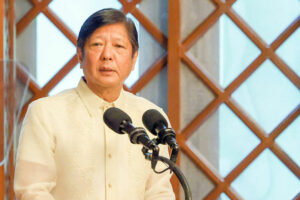PHILIPPINE PRESIDENT Ferdinand R. Marcos, Jr. said his administration’s campaign against fraudulent public works projects is needed to sustain economic growth, as he ordered the realignment of P255.5 billion from questionable flood control programs toward social services, healthcare, education and agriculture.
Speaking in a podcast released across his social media platforms on Monday, the President said the discovery of widespread “ghost” infrastructure projects revealed how deeply corruption has penetrated the bureaucracy, warning that unchecked abuse risks derailing the country’s development goals.
“Nothing will happen to the Philippines if we carry on this way,” he said in mixed English and Filipino. “The economy will never grow properly… We will not get anywhere.”
The Philippines, which faces an average of 20 typhoons each year, is probing a multibillion-peso infrastructure scandal after a string of storms and monsoon rains triggered heavy flooding.
The investigation has exposed alleged corruption within the Department of Public Works and Highways (DPWH), prompting Mr. Marcos to suspend flood control allocations in the 2026 budget.
He argued that halting dubious projects would not slow economic momentum, adding that rechanneling funds into classrooms, hospitals, insurance and agriculture would provide stronger, more equitable growth.
Of the total, P26 billion will go to the Department of Education for new classrooms, P29 billion to the Department of Health for hospital projects and medical aid and P60 billion to the Philippine Health Insurance Corp. (PhilHealth) to expand coverage.
Another P39 billion is earmarked for the Department of Agriculture, while the Department of Social Welfare and Development will receive additional support to sustain cash assistance programs.
To avoid a repeat of past abuses, Mr. Marcos plans to reinstate inspection procedures requiring local governments to verify national projects before contractors are paid. He noted that while tools such as blockchain could enhance transparency, the core issue has been weak enforcement of existing rules.
The President said investigations led by the newly formed Independent Commission for Infrastructure (ICI) would be based on evidence rather than politics.
“We must be thorough,” he said. “If we are actually going to punish these people, we have to be very, very clear about what we are doing, and we have to be very, very clear that we go after the guilty ones.”
The reallocation comes as the government faces rising reconstruction costs following recent earthquakes and typhoons in Cebu, Samar and Masbate.
Also on Monday, House Deputy Minority Leader and Party-list Rep. Leila M. de Lima said the President’s decision not to include a bill crafting a fact-finding body on the multibillion-peso flood control scandal among his administration’s priority raises questions about the government’s commitment to probing the controversy.
The cancellation of congressional hearings into bogus flood control deals, along with the ICI’s decision to conduct proceedings behind closed doors underscored the need to include the proposed fact-finding bill as a legislative priority, she said in a statement.
“If the President is truly serious about holding those accountable for the biggest corruption scandal in our country’s history, he must certify this proposed bill as urgent,” she added.
The Philippines is facing a widening scandal over billions of pesos worth of flood control projects, and Congress had launched separate investigations amid allegations of kickbacks tied to public works contracts.
Mr. Marcos has formed an independent commission to investigate anomalies in flood control and other infrastructure projects, with authority to recommend criminal, civil and administrative charges.
The Legislative-Executive Development Advisory Council last week endorsed 44 priority bills for streamlined passage, covering measures on governance, social services and energy security.
Ms. De Lima said she and other co-authors of House Bill No. 4453 are hoping for the proposal’s quick approval at the House of Representatives, citing Speaker Faustino “Bojie” Dy III’s openness to the measure.
The House bill proposes a five-member commission to probe corruption in flood control projects, granting it access to state records as well as subpoena and contempt powers to compel compliance.
“I actually brought it up already with the new Speaker,” Ms. De Lima said. “And he’s very open and very receptive about it. He will push for its speedy enactment, and he would even try to convince the President to certify it as urgent.” — Chloe Mari A. Hufana and Kenneth Christiane L. Basilio
